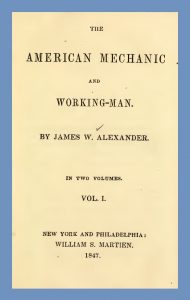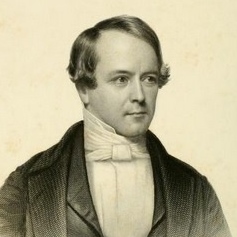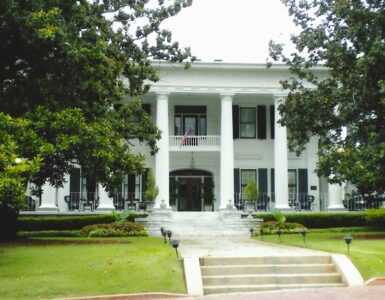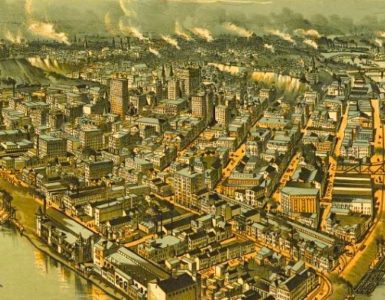 The following excerpts are from the two volume set, The American Mechanic and Working Man, 1847, by James W. Alexander. Alexander originally published the selections in a newspaper series. Note that he uses “working man” to designate “the artisan, the mechanic, the operative, or the laborer; all, in a word, who work with their hands” (2:215). Despite archaic terms and a strong class consciousness, Alexander has some ideas that transfer well into the twenty-first century. This article is the 201st posted on Presbyterians of the Past since the site began in August 2015 and the author has decided to take a sabbatical from digital dissertations until March. Collected in the site archives are articles the author particularly enjoyed writing and it is believed they still read well, such as B is for Breckinridge, which begins a collection of biographies about an important Kentucky family (the biography of Samuel M. Breckinridge is particularly interesting); a humorous one is B. B. Warfield’s Premature Obituary which plays off a quote by Mark Twain; Henry A. Boardman, long-time pastor of Tenth Presbyterian Church, Philadelphia; a minister of varied interests who left an architectural monument, Zelotes L. Holmes; Augustus W. Loomis was a missionary to China and a minister to the Chinese in California; and a Bermudan transplanted to America to teach seminary, Francis L. Patton. The centennial year for the end of the First World War is over but the biographies of Lt. Joseph Volney Wilson and Chaplains John Wesley Ischy and T. M. Bulla tell their contributions to victory.
The following excerpts are from the two volume set, The American Mechanic and Working Man, 1847, by James W. Alexander. Alexander originally published the selections in a newspaper series. Note that he uses “working man” to designate “the artisan, the mechanic, the operative, or the laborer; all, in a word, who work with their hands” (2:215). Despite archaic terms and a strong class consciousness, Alexander has some ideas that transfer well into the twenty-first century. This article is the 201st posted on Presbyterians of the Past since the site began in August 2015 and the author has decided to take a sabbatical from digital dissertations until March. Collected in the site archives are articles the author particularly enjoyed writing and it is believed they still read well, such as B is for Breckinridge, which begins a collection of biographies about an important Kentucky family (the biography of Samuel M. Breckinridge is particularly interesting); a humorous one is B. B. Warfield’s Premature Obituary which plays off a quote by Mark Twain; Henry A. Boardman, long-time pastor of Tenth Presbyterian Church, Philadelphia; a minister of varied interests who left an architectural monument, Zelotes L. Holmes; Augustus W. Loomis was a missionary to China and a minister to the Chinese in California; and a Bermudan transplanted to America to teach seminary, Francis L. Patton. The centennial year for the end of the First World War is over but the biographies of Lt. Joseph Volney Wilson and Chaplains John Wesley Ischy and T. M. Bulla tell their contributions to victory.
Barry Waugh
The fashion industry apparently has not changed since Alexander’s day.
Everyone is ready enough to cry out against the tyranny of fashion, yet almost everyone meekly submits. Here and there, in my daily walks, I fall in with a few elderly men, fellows of the old school, who prefer comfort to appearances. You may know them a hundred yards off by the easy, contented, independent carriage of their bodies, and the fulness and simplicity of their garb. The cut of their coats is not very unlike that of the year eighteen hundred and their red cheeks would dissolve in a healthy smile if you should speak to them of the reigning mode.
I am no friend to mere fashion as a directress of life; she is a capricious sultana who mocks us into disguises and then punishes us for compliance. Who can count the money out of which she has cheated the mechanics of America! (1:35)
The pleasures of hunting with one’s dog are explained.
Nothing can be more natural than that a man of sedentary and confined pursuits should feel a strong attraction to sports of the field. It has been so in all countries and in every age. The freedom of traversing the open country in fine weather with a sense of leisure, and the buoyant excitement of expected trophies has something which enchants a mind at ease. And it cannot be denied that when taken in moderation, the amusement and exercise of the sportsman contribute greatly to vigorous health. The American, restrained by no game-laws and enjoying a state of social confidence, which in most cases prevents any vindictive action in cases of trespass, is led to exercise his prerogative; hence many addict themselves to this recreation…. (1:86)
Thoughts regarding the importance of history are presented by Alexander.
The study of history has commended itself to considerate men of all ages perhaps more generally than any branch of intellectual pursuit. Holding a middle place between mere entertainment and abstruse research, it has allured into its wide and variegated fields the curious and the reflecting of every different walk of life. And this is reasonable and easy to explain. Often has it been said, till the sentence has grown into a proverb, that “history is philosophy teaching by example.” Often have the words of the Roman orator been reiterated, that “not to know what happened before one was born, is to be always a child.” If our great statesmen could be questioned, it would be found that they have gained more concerning the principles of government from the story of former times, than from all their perusal of abstract treatises….
But to this we must add other signal and acknowledged benefits which flow from historical reading whenever pursued. It enlarges our knowledge of the world and gives new views of human manners; it lifts us above the petty circle of our city or our state and brings us into a felt relation to the great system of events; it affords a lively commentary on the happy or baneful tendencies of virtue and vice; and it displays in the most striking manner the wise and wonderful plans of Divine Providence. (1:246, 247)
He turns to Aristotle to illustrate the importance of developing early a child’s memory.
Aristotle held, as I am told by the schoolmaster, that all remembrance is owing to a physical impression made on the brain. Thus, he is enabled to account for the quickness and shortness of memory in children because the brain of the little one is soft and therefore is easily marked, but just as easily loses it. On the other hand, the brain of old men is tough and rigid, so that it neither takes nor loses an impression with facility. This theory serves to illustrate the principle that it is in early life when the memory must be chiefly disciplined. This is a most important truth in education, but very much overlooked in the pretended philosophy of education. It is important for directing us to the proper studies for our children. There are some things which we must teach them now because they cannot learn them so well hereafter; there are other things which we must teach them hereafter because they cannot learn them any better, if even so well, now. The things which children should learn young are those which exercise memory rather than reason, such as whatever concerns language and is important to remember in certain terms. All rules and forms which will be perpetually coming into play in subsequent studies or in active life should be deeply engraved upon the memory. Rules of grammar, religious catechisms, and the words of Holy Scripture are especially of this sort. And a parent is trifling with the future happiness and usefulness of a child when he allows himself to be decoyed into the absurd rule of inculcating nothing upon the memory until it can be comprehended by the understanding. (2:101-102)
On the importance of having virtue, industry, and a sense of the common good for there to be true liberty.
The upshot of the matter is this—people should be taught from their cradles what true freedom is and how it is to be maintained; how it differs from lawlessness and misrule and how closely it is connected with popular virtue. The boy at school and in the shop should be taught that nothing can be done without order; that there can be no order without law; that all law demands obedience; and that in such obedience to rightful authority there is nothing which either injures or degrades. The apprentice and the journeyman would learn that if a single pin of the social machine is loosened, it is like loosening the pin of a steam-engine and wherever disorganization may begin it will never stop till it ruins those who have begun it. When public disorders, civil broils, and revolutionary violence have entered, the very class of persons who always bear the worst of the tempest is that for whose benefit I am writing–the honest, temperate, home-loving, industrious, frugal working-men. (2:134).





